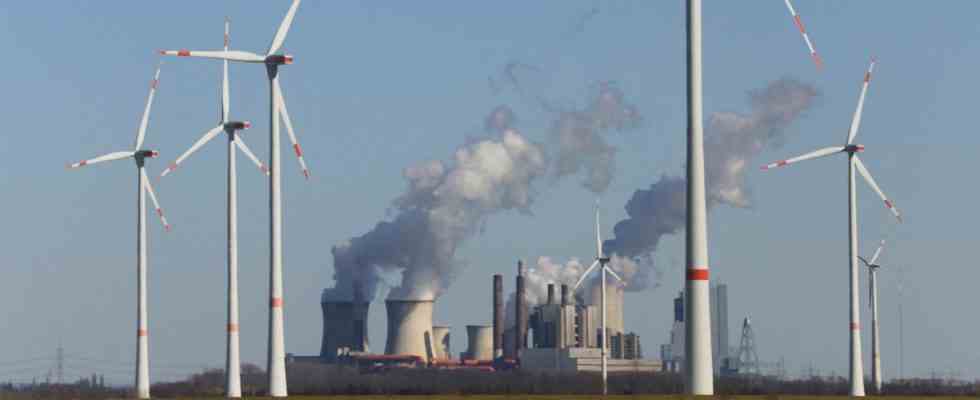It was a lucrative but also a turbulent year for the power company RWE. In Lützerath there were bitter protests against the fact that the abandoned village south of Mönchengladbach fell victim to the Dax company’s lignite excavators. So it’s no wonder that CEO Markus Krebber doesn’t want to look back on this episode at the balance sheet presentation on Tuesday in Essen. “It’s incredibly important that we look ahead now,” he says when asked the relevant question. It is now a matter of “pushing ahead with the expansion of renewable energies in Germany and leaving as much coal in the ground as possible”.
Sounds paradoxical: the RWE boss wants to dredge up the lignite under Lützerath, but at the same time would rather sooner rather than later stop burning the climate killer in his power plants. Behind this apparent contradiction stands Krebber’s ambitious plan to green the power company. Because of the energy crisis, two lignite-fired power plant blocks remain for the time being on the net, which RWE wanted to switch off at the turn of the year. And the plants need the raw material from Lützerath, according to the company’s reasoning. The group – formerly one of the biggest climate sinners on the planet – will completely phase out coal in 2030 instead of 2038.
High investments in wind farms
Instead, Krebber relies on renewable energies: between 2021 and 2030 50 billion euros in wind and solar parks, in battery storage and in gas-fired power plants, which RWE intends to fire with climate-friendly hydrogen in the future. 15 billion euros of this are to be allocated to Germany. Last year alone, the Essen-based company invested 4.4 billion euros worldwide, a good half more than in 2021. The most expensive items were two wind farms in the North Sea, one in Germany and one in Britain. In the current year, RWE will invest “significantly more again,” says CFO Michael Müller.
The green swing is already paying off. The operating profit of the wind and solar parks increased by two-thirds last year to a total 2.2 billion euros. The two divisions benefited from the high electricity prices and from the fact that new systems were connected to the grid. Coal and nuclear power plants, on the other hand, contributed only 0.8 billion euros to operating profit, a sixth less than in 2021. The decline was due to RWE shutting down power plants. The company will shut down its last nuclear reactor in Lingen, Lower Saxony, in three weeks.
The excess profit tax will be expensive
However, the biggest profit makers were the gas-fired power plants. The operating result of the division with gas, biomass and hydroelectric power plants tripled to 2.4 billion euros. The expensive gas-fired power plants were used more frequently than usual last year and benefited from higher prices.
However, Krebber and his board members expect that the profits of the gas-fired power plants will fall again in the current year. For this, they should continue to rise in the eco-systems. Overall, the group with its 18,300 employees achieved an operating result of 6.3 billion euros in 2022, of which 3.2 billion euros remained as profits. This profit will fall to well below three billion euros in the current year.
One burden will be the excess profit taxes, with which EU countries and Great Britain skim off the profits of the energy suppliers. Last year, RWE incurred a quarter billion euros, but the levy was only introduced in important markets in December. For 2023, the management therefore expects higher payments.
CEO Krebber complains that “constant debates” about the rules on the electricity market or skimming off profits are unsettling companies. That is already delaying investment decisions, says the 50-year-old, who has been in charge of RWE since 2021. The manager also demands that the government withdraw “as soon as possible” from the energy companies that were nationalized during the crisis. This refers to the gas importers Uniper and Sefe.
Tankers with liquefied natural gas are to dock in front of Rügen
The federal government received praise for speeding up the approval process for the expansion of renewable energies. However, only “the next 18 months will show” whether that is really enough, says the former McKinsey consultant and banker.
Krebber also demands that the EU Commission should approve subsidies more quickly and easily. Compared to the US government’s aid program, the so-called IRA law, EU funding is too complicated. Politicians must also support manufacturers of green technologies in Europe – such as parts for wind turbines – so that production capacities can keep up with demand, he says. Exactly in this direction an initiativewhich the EU Commission presented just last week.
Despite all the beautiful green plans and demands: RWE has recently been in the headlines again because of a controversial project that has to do with energy that is harmful to the climate. The federal government is planning a terminal for liquefied natural gas (LNG) off Rügen, and RWE has started exploration work on behalf of the federal government. The group is to operate the plant, with Krebber emphasizing that Berlin has not yet made a decision. RWE also does not want to be involved in such terminals in the long term, but rather sell them again soon, says the manager: “We only help because we can.”

